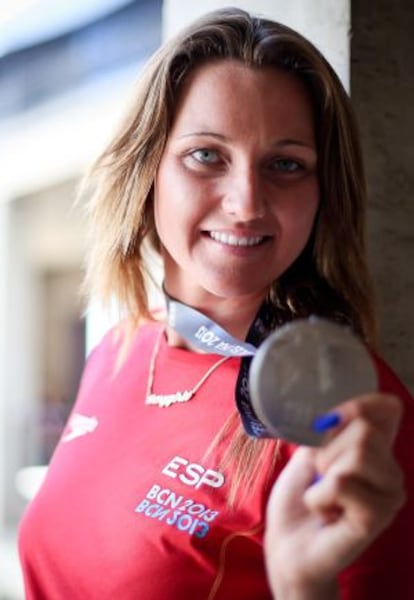“The last part of a race you swim with your heart”
On Tuesday, Melani Costa broke the Spanish record during the 200m freestyle heats


Melani Costa Schmid swam the fourth-fastest time in history in the 400m freestyle at the Fina World Championships in Barcelona on Sunday to win a silver medal. The 24-year-old Mallorcan’s dedication to a demanding and addictive sport was concentrated in a little over four minutes as she added a long-course medal to her world gold and European silver over the same distance in short-course competition.
On Tuesday, Costa broke the Spanish record during the 200m freestyle heats.
Question. Few people understand how difficult it is to win a medal. Would you do it all again if you were 10 years old?
Answer. If I had only been told how difficult it is, no. But if I had been told that as well as being difficult it had this reward, then yes.
Q. Is the pool addictive?
A. It teaches you the meaning of suffering but also gives so much back that you need the water. Leaving it in an instant is impossible. It’s practically a drug.
Q. People who swim for leisure find themselves relaxed after a few lengths. Is it the same for you?
A. At a competitive level you feel awful after a training session. You have to lie down, rest and eat a lot. You don’t feel all that great. Sometimes you don’t recover in time for the next session. Your shoulders feel heavy. You have to get used to training through pain, but the reality is you never do.
Q. How are you training sessions in Florida with Gregg Troy?
A. Americans are very strict. If the day starts at 6am, it doesn’t matter if you’re not down to train that day, or at that hour, you have to get up with everybody else. We go running singing the college song, like in the marines. I adapted to it. I did what I had to do. We swam a lot of lengths and sometimes we had purely technical sessions, it was very varied, you never knew what the next session would be.
In the US, they prepared me for real suffering, to learn to be confident in myself "
Q. What did your coaches teach you?
A. My first coach, Atienza, taught me about being a person, and to train with the boys and go at their pace. Later, Rafa Huete taught me technique and endurance. In the US, they prepared me for real suffering, to learn to be confident in myself and to be realistic, and to feel that I could be very good at this. I had always looked up to people: I thought everyone else was incredible. There, they made me see that I had to stop messing about because I had ability as well. They instilled in me that if I really believed in myself, I could go far.
When I returned to Spain Jordi Murio also taught me a lot of things, above all how to control my own body, to know what I need at all times and in every discipline to be able to control races. I learned to know how fast and how far I was going without looking at a stopwatch, and that is very important. In competitions you have to know when you’re going at 100 percent and when you’re going at 99 percent. You have to learn how to measure the splits. If you need to go at one minute, you have to go at one minute: if you go at 58 seconds or 63 seconds you’re going wrong.
Q. In the 400m final you hit 30 seconds for each length. How do you calculate that?
A. You don’t think about it at the end of the day. We all know where 25 meters is when we close our eyes, without even counting the strokes. It’s ingrained. You can be swimming in a daydream and still be perfectly aware of your rhythm and your position in the pool.
Nowadays, the girls are getting stronger all the time"
Q. What have you been working on since last year?
A. The past year, with José Antonio del Castillo, I have improved some technical problems with the biomechanist at the CAR \[high-performance training center\] and I have gained strength. I have spent much more time in the gym weight training, lifting weights until even my joints, which are quite weak, stand up to it.
Q. Why are swimmers more and more defined in terms of muscle?
A. Before, the swimmer with the most class won, the one who floated better or the one who moved better. Nowadays, the girls are getting stronger all the time, working on their arms so that with every stroke they cover more distance. If I hadn’t gone to the gym, I wouldn’t have improved very much.
Q. Ryan Lochte says abdominal exercises are fundamental for him. Are they for you?
A. I have a little bit of a stomach. It helps me with buoyancy. If I’m too thin, I don’t float and if I’m a little broader than I should be, I need to carry more weight.
Q. Many people thought you’d never shave four seconds off your personal best...
A. I thought it was impossible as well... if it takes you two years to go half a second faster! Before the race I knew exactly what I had to do: keep up with \[Katie\] Ledecky and not let go. You can’t think that you’re going to sink, because in the end if you think it, it can happen. The last part of a race you swim with your heart. If I had been thinking about how tired I was, I wouldn’t have ended up with a medal.
More information








































